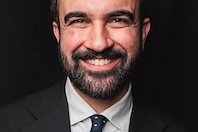Text: Fr Kieran Fitzsimons ofm World Aids Day homily

Fr Kieran Fitzsimons ofm gave the following homily at the World AIDS Day Mass on 1 December at the Church of the Immaculate Conception, Farm Street, London.
Readings: 2 Cor. 12:7-10. - Ps. 102 (103). - Mt. 8:5-13.
Hope … in the Midst of Deep Suffering
Pope Francis said, "All human suffering is sacred to God. Before God we are not strangers, or numbers. We are faces and hearts, known one by one, by name." [27 January 2022]
In this evening's Scripture Readings, we have two contrasting situations. In the First Reading, St. Paul refers to a persistent thorn in his flesh. Paul's prayer for relief seems to remain unanswered, or rather answered not according to his pleading. He is obliged to live with that thorn. In the Gospel, a Roman soldier's prayer is answered, and answered swiftly. There has been some speculation about these two scenarios. What comprised Paul's thorn? What was the relationship between the centurion and his servant? What Paul and the soldier do have in common is that they were desperate, both driven to pleading.
At certain crisis points in our lives, we may be driven, in extreme physical, emotional or spiritual pain, to beg for relief or healing, either on behalf of ourselves or a loved one. Those desperate pleadings may be heard or not, according to our understanding and situation. We may be hugely relieved or hit up against a brick wall, experience a liberating rescue, or the bewilderment and terror of being left in an awful situation. It is only with the wisdom of distant hindsight, that we may glimpse some understanding of the role painful experiences play in our lives and the lives of loved ones. However, such understanding may only be revealed to us in the next life … meanwhile, we may reconcile or continue to wrestle with the mystery of this suffering in our earthly life.
For St. Paul, the startling answer to his prayer is two-fold: My grace is enough for you: and my power is at its best in weakness. Paul, of strong personality, discovers that when he is weak, paradoxically he is strong. Perhaps, that revelation came suddenly, or over a period of time: when I am weak … … I am strong. For Paul, this not only refers to weaknesses, but also encompasses insults, hardships, persecutions and agonies. Paul suffers these for Christ's sake and experiences the power of Christ over him.
That is an enormous challenge for most of us. It is not an invitation to mere passivity, but to engage in partnership with God in navigating the challenges strewn along the paths of our individual and collective lives.
Many of us are conditioned to avoid weakness, particularly the public expression of weakness, and to value strength, competence, being in-control. Contemporary society feeds into this. Quite some years ago, I read the catalogue of qualities required in a particular job description … and thinking even Jesus of Nazareth wouldn't make the shortlist!
Generally, weakness visits us in unexpected and unwanted guises, either internally, or externally, in the challenging situations we find ourselves. Weakness uncomfortably reminds us of our human limitations and inadequacies. But, weakness can also teach us to let go of the illusion of being in control and nudge us into the realm of a healthy need of God's grace and power. Most importantly, it can teach us compassion … for ourselves … and for people around us.
In the midst of all this, we may be graced to discover and experience moments of a new, raw, deeper beauty, love and life … within and without … …
In the Gospel, we observe the centurion seeking help for someone else and not himself. His servant is lying at home paralysed, and in great pain. Here is a soldier accustomed to being under authority and also exercising authority. In vulnerability and the encounter with sheer goodness, he is humbled.
Jesus defies religious and cultural taboos and responds by generously offering to visit the centurion's house to perform a healing. However, the centurion suggests that Jesus' word of authority is enough. Jesus is staggered by the simple, profound faith of the centurion, who probably was a Roman pagan.
The outsider becomes an insider! Limitations, boundaries, stereotypes, all dissolve in the embrace of compassion. A feared and ritually unclean man becomes an extraordinary role model in faith. This gives many of us great hope … A position outside a particular organised religion becomes transformed. A person on the religious periphery is propelled into the very heart of a miraculous relationship with Jesus of Nazareth …
Richard Rohr said, "To finally surrender ourselves to healing, we have to have three spaces opened up within us - and all at the same time: our opinionated head, our closed-down heart, and our defensive and defended body. That is the summary work of spirituality - and it is indeed work. Yes, it is also the work of a Power greater than ourselves … " [Radical Grace: Daily Meditations
My dear sisters and brothers, especially in times of brokenness and doubt, may the faith of that centurion comfort and sustain us, so that we may know in the depths of our being … that all shall be well … and all manner of things shall be well.


















